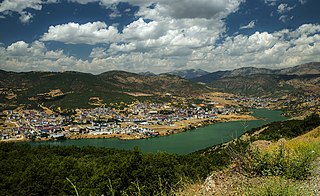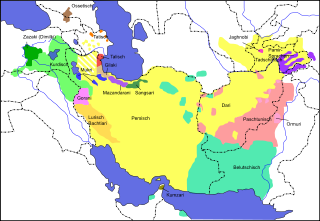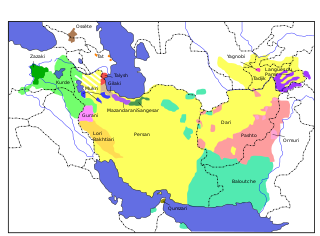
Kurdish is a language or a group of languages spoken by Kurds in the geo-cultural region of Kurdistan and the Kurdish diaspora. Kurdish languages constitutes a dialect continuum, many of which are not mutually intelligible, belonging to Western Iranian languages in the Indo-European language family. The main three dialects or languages of Kurdish are Northern Kurdish, Central Kurdish, and Southern Kurdish.

Abdullah Öcalan, also known as Apo, is a political prisoner and founding member of the militant Kurdistan Workers' Party (PKK).

Tunceli is a municipality (belde) in Tunceli District and capital of Tunceli Province, Turkey. The city has a Kurdish majority and was a site of the Dersim rebellion. It had a population of 35,161 in 2021.

Zaza or Zazaki is a Northwestern Iranian language spoken primarily in eastern Turkey by the Zazas, who are commonly considered as Kurds, and in many cases identify as such. The language is a part of the Zaza–Gorani language group of the northwestern group of the Iranian branch. The glossonym Zaza originated as a pejorative and many Zazas call their language Dimlî.

Bingöl Province is a province of Turkey. The province was known as Çapakçur Province before 1945 when it was renamed as Bingöl Province. Its area is 8,003 km2, and its population is 282,556 (2022). The province encompasses 11 municipalities, 325 villages and 693 hamlets.

The Zazas are a people in eastern Turkey who traditionally speak the Zaza language, a western Iranian language written in the Latin script. Their heartland consists of Tunceli and Bingöl provinces and parts of Elazığ, Erzincan and Diyarbakır provinces. Zazas generally consider themselves Kurds, and are often described as Zaza Kurds by scholars.
Roj TV was an international Kurdish satellite television station broadcasting programmes in the Kurmanji, Sorani and Hewrami dialects of the Kurdish language as well as in Persian, Zaza, Arabic, and Turkish.

Turkish Kurdistan or Northern Kurdistan refers to the southeastern part of Turkey where Kurds form the predominant ethnic group. The Kurdish Institute of Paris estimates that there are 20 million Kurds living in Turkey, the majority of them in the southeast.

The Kurds are the largest ethnic minority in Turkey. According to various estimates, they compose between 15% and 20% of the population of Turkey. There are Kurds living in various provinces of Turkey, but they are primarily concentrated in the east and southeast of the country within the region viewed by Kurds as Turkish Kurdistan.

Nazımiye is a municipality (belde) and seat of the Nazımiye District of Tunceli Province in Turkey. It had a population of 1,262 in 2021.

The Koçgiri rebellion was a Kurdish uprising, that began in the overwhelmingly militant Koçgiri region in present-day eastern Sivas Province in February 1921. The rebellion was initially Alevi, but it succeeded in gathering support from nearby Sunni tribes. The tribal leaders had a close relationship with the Society for the Rise of Kurdistan (SAK). The rebellion was defeated in June 1921.
Kurds have had a long history of discrimination perpetrated against them by the Turkish government. Massacres have periodically occurred against the Kurds since the establishment of the Republic of Turkey in 1923. Among the most significant is the massacre that happened during the Dersim rebellion, when 13,160 civilians were killed by the Turkish Army and 11,818 people were sent into exile. According to McDowall, 40,000 people were killed. The Zilan massacre of 1930 was a massacre of Kurdish residents of Turkey during the Ararat rebellion, in which 5,000 to 47,000 were killed.

The Sheikh Said rebellion was a Kurdish nationalist rebellion in Turkish Kurdistan in 1925 led by Sheikh Said and with support of the Azadî against the newly-founded Turkish Republic. The rebellion was mostly led by Zaza speakers, but also gained support among some of the neighboring Kurmanji-speaking Kurds in the region.
Kurdish nationalist uprisings have periodically occurred in Turkey, beginning with the Turkish War of Independence and the consequent transition from the Ottoman Empire to the modern Turkish state and continuing to the present day with the current PKK–Turkey conflict.
TRT Kurdî is the first national television station that broadcasts in Kurdish dialect of Kurmanji and in Zazaki. On the channels sixth anniversary it changed its name from TRT 6 into TRT Kurdi. The channel has been mostly met with criticism from the Kurdish population in Turkey on various grounds, including accusations of being a mouthpiece for the government. A 2018 survey asking Kurds about TRT Kurdî showed that a majority (59%) did not trust the channel.
Pazukî is a Kurdish tribe whose members live in different regions in Kurdistan as well as in and around Tehran, Iran. The tribe is mentioned in the 16th century Kurdish historical book Sharafnama by Sharaf Khan Bidlisi. There are some variants of the name Pazuki and they are known under the various names, like Bazikî, Bozukan, Bazukan etc. Pazukî was originally a tribal confederation like Rojiki Kurds. Some branches of them speak Kurmanji and the others speak Zazakî. But Henry Field mentioned their Iranian branch also as a Turcophonic community in 1939.
Hüseyin Aygün is a Turkish lawyer and politician of Alevi Zaza origin. He is a former Member of the Grand National Assembly of Turkey for the Republican People's Party (CHP) and a founder of the Tunceli Bar Association.

Tunceli Province, formerly Dersim Province, is a province in the Eastern Anatolia Region of Turkey. The province is considered part of Turkish Kurdistan and has a Kurdish majority. Moreover, it is the only province in Turkey with an Alevi majority. Its population is 84,366 (2022). The province has eight municipalities, 366 villages and 1,087 hamlets.

The Democracy Time Party is a political party founded by Mehmet Ali Şenel on 9 May 2016. The short name of the party is DEZA-PAR

Ehmedê Xasî was a Kurdish literary figure and Mufti. He is best known for his work Mewlîdu'n-Nebîyyî'l-Qureyşîyyî from 1899 which is considered the first literary work in Zaza.













